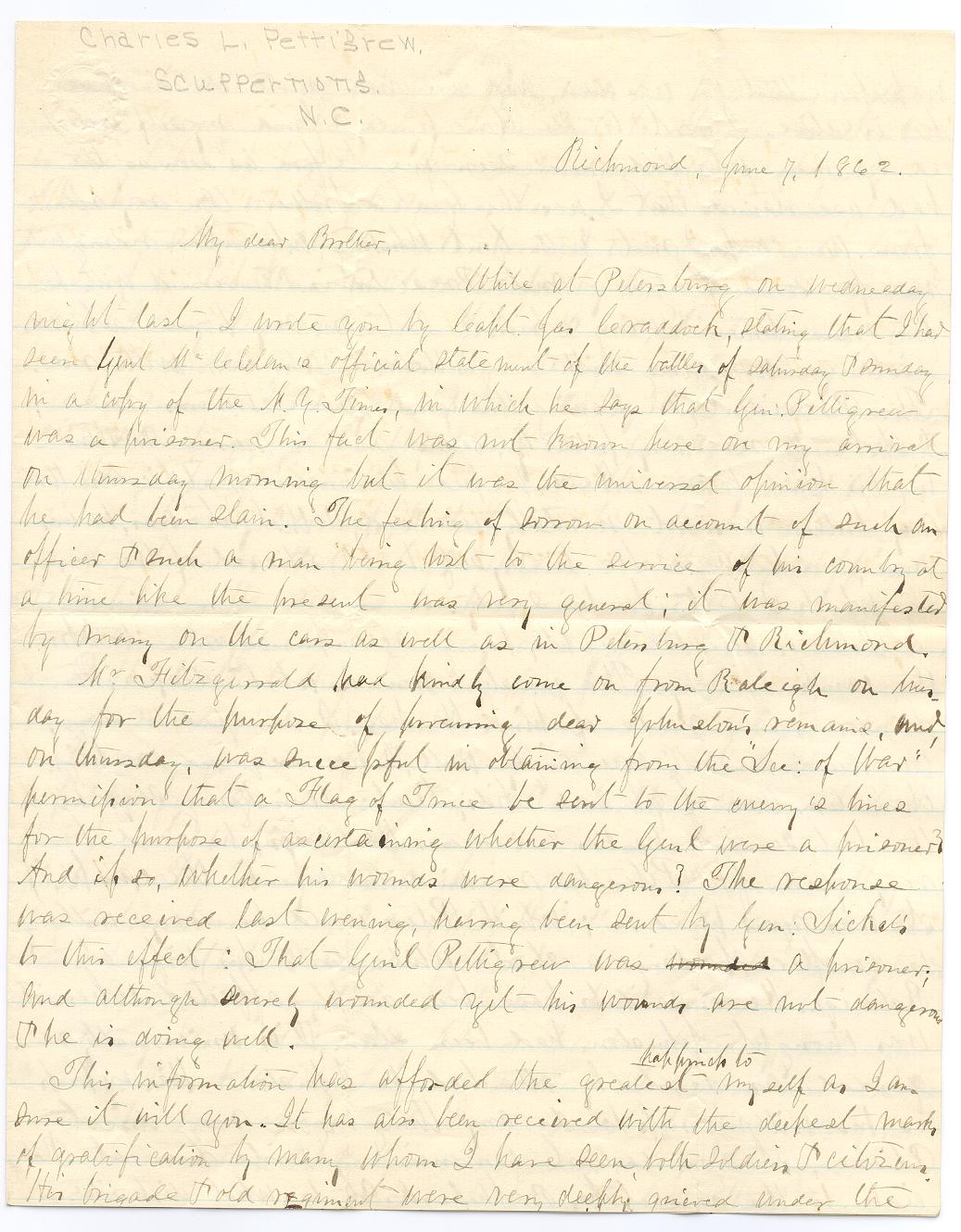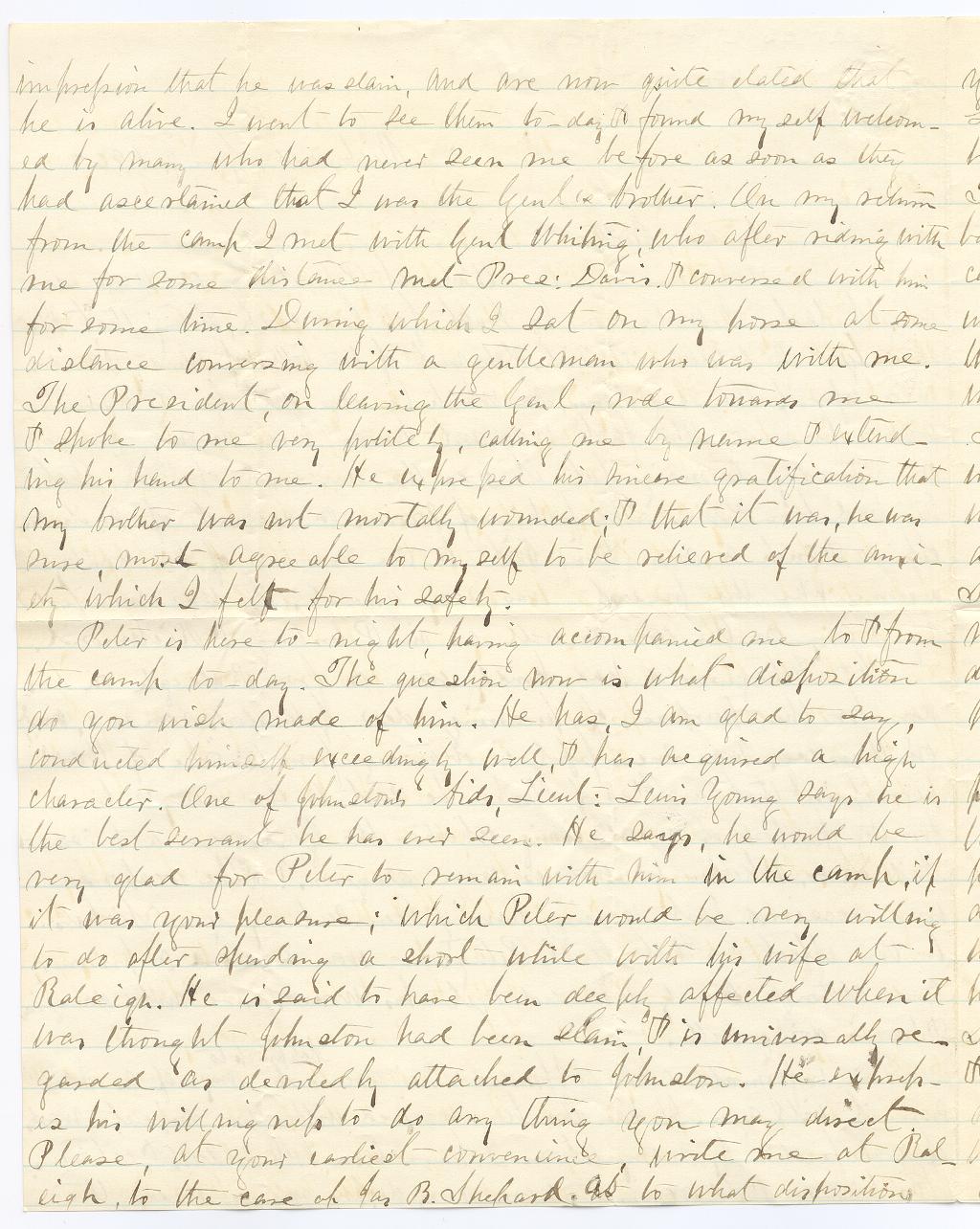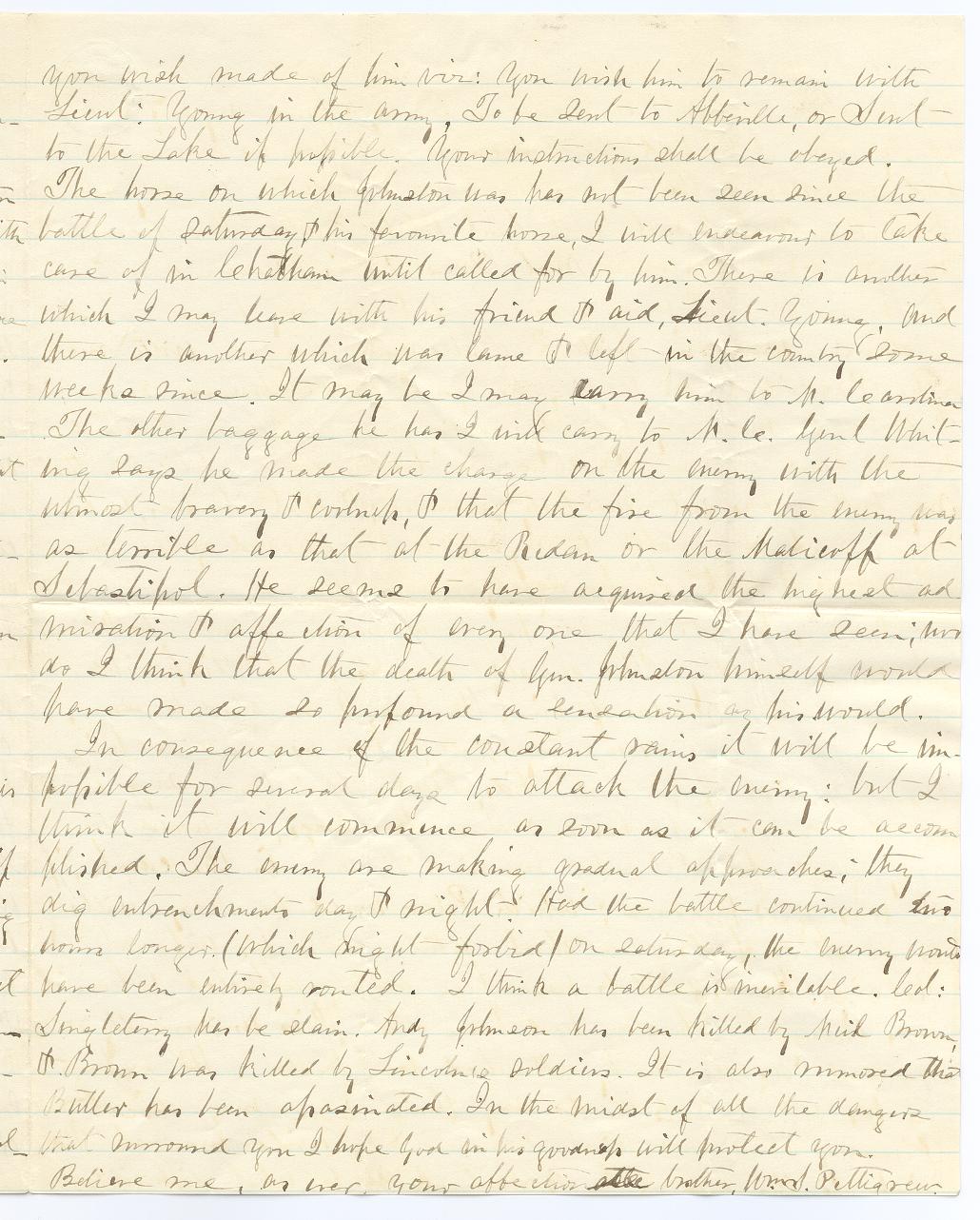Item description: Letter, 7 June 1862, from William S. Pettigrew to his brother Charles L. Pettigrew. William gives an update on the fate of his brother, General James Johnston Pettigrew, who was thought to have been slain at the Battle of Seven Pines. New information reveals that the General has survived his wounds, but has been captured and imprisoned. The letter also reports on the fate of Peter, one of Charles’s slaves who was sent to serve as a body servant to General Pettigrew on the battle front in Virginia.
Item citation: From folder 254 of the Pettigrew Family Papers #592, Southern Historical Collection, Wilson Library, University of North Carolina at Chapel Hill.
Item transcription:
[Charles L. Pettigrew
Scuppernong, N.C.]
Richmond, June 7, 1862
My dear Brother,
While at Petersburg on Wednesday night last, I wrote you by Capt. Ja. Craddock, stating that I had seen Genl. McClelan’s official statement of the battle of Saturday & Sunday in a copy of the N.Y. Times, in which he says that Gen. Pettigrew was a prisoner. This fact was not known here on my arrival on Thursday morning but it was the universal opinion that he had been slain. The feeling of sorrow on account of such an officer & such a man being lost to the service of his country at a time like the present was very general; it is manifested by many on the cars as well as in Petersburg & Richmond.
Mr. Fitzpatrick had kindly come on from Raleigh on tuesday for the purpose of procuring dear Johnston’s remains, and on thursday was successful in obtaining from the “Sec. of War” permission that a Flag of Truce be sent to the enemy’s lines for the purpose of ascertaining whether the Genl. were a prisoner? And if so, whether his wounds were dangerous? The response was received last evening, having been sent by Gen. Sickel’s to this effect. That Genl. Pettigrew was a prisoner; and although severly wounded yet his wounds are not dangerous & he is doing well.
This information has afforded the greatest happiness to myself as I am sure it will you. It has also been received with the deepest mark of gratification by many whom I have seen both soldiers & citizens. His brigade & old regiment were very deeply grieved under the impression that he was slain, and are now quite elated that he is alive. I went to see them to_day & found myself welcomed by many who had never seen me before as soon as they had ascertained that I was the Genl’s brother. On my return from the camp I met with Genl. Whiting; who after riding with me for some distance met Pres. Davis & conversed with him for some time. During which I sat on my horse at some distance conversing with a gentleman who was with me. The President, leaving the Genl, rode towards me & spoke to me very politely, calling me by name & extending his hand to me. He expressed his sincere gratification that my brother was not mortally wounded; & that it was, he was sure, most agreeable to myself to be relieved of the anxiety which I felt for his safety.
Peter is here to_night, having accompanied me to & from the camp to_day. The question now is what disposition do you wish made of him. He has, I am glad to say, conducted himself exceedingly well, & has acquired a high character. One of Johnston’s Aids, Lieut. Lewis Young says he is the best servant he has ever seen. He says, he would be very glad for Peter to remain with him in the camp, if it was your pleasure; which Peter would be very willing to do after spending a short while with his wife at Raleigh. He is said to have been deeply affected when it was thought Johnston had been slain, & is universally regarded as devotedly attached to Johnston. He expresses his willingness to do any thing you may direct. Please, at your earliest convenience, write me at Raleigh to the care of Jas. B. Shepard, as to what disposition you wish made of him viz: you wish him to remain with Lieut. Young in the army, to be sent to Abbeville, or sent to the Lake if possible. Your instructions shall be obliged. The horse on which Johnston was has not been seen since the battle of Saturday & his favorite horse, I will endeavour to take care of in Chatham until called for by him. There is another which I may leave with his friend & aid, Lieut. Young. And there is another which is lame & left in the country some weeks since. It may be I may carry him to N. Carolina. The other baggage he has I will carry to N.C. Genl. Whiting says he made the charge on the enemy with the utmost bravery & coolness, & that the fire from the enemy was as terrible as that at the Redan or the Malicoff at Sebastipol. He seems to have acquired the highest admiration & affection of every one that I have seen; nor do I think that the death of Gen. Johnston himself would have made so profound a sensation as his would.
In consequence of the constant rains it will be impossible for several days to attack the enemy; but I think it will commence as soon as it can be accomplished. The enemy are making gradual approaches; they dig entrenchments day & night. Had the battle continued two hours longer (which might – forbid) on Saturday, the enemy would have been routed. I think a battle is inevitable. Col. Singletary has be slain. Andy Johnson has been killed by [Neil?] Brown, & Brown was killed by Lincoln’s soldiers. It is also rumored that Butler has been assasinated. In the midst of all the dangers that surround you I hope God in his goodness will protect you.
Believe me, as ever your affectionate brother, Wm. S. Pettigrew




